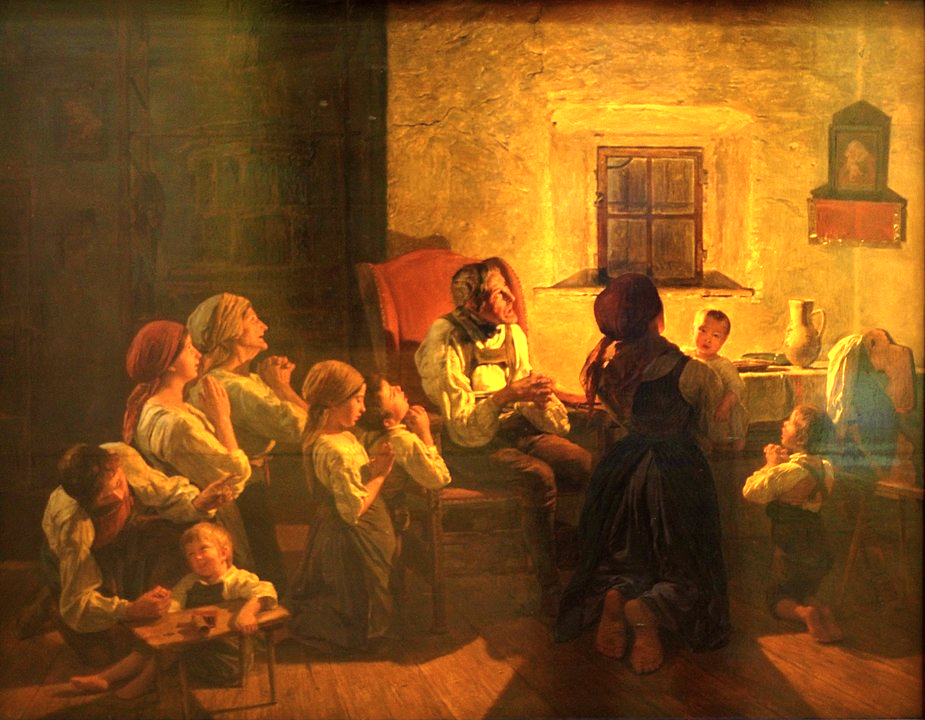Byzantine Icon of Holy Family
Translation of the Holy Gospel According to Luke
When Jesus was twelve years old, they going up into Jerusalem according to the custom of the feast, and having fulfilled the days, when they returned, the Child Jesus remained in Jerusalem, and His parents knew it not. And thinking that He was in the company, they came a day’s journey, and sought Him among their kinsfolk and acquaintances. And not finding Him, they returned into Jerusalem, seeking Him. And it came to pass that after three days they found Him in the Temple, sitting in the midst of the doctors, hearing them and asking them questions. And all that heard Him were astonished at His wisdom and His answers. And seeing Him they wondered. And His Mother said to Him: Son, why hast Thou done so to us? Behold Thy father and I have sought Thee sorrowing. And He said to them: how is it that you sought Me? Did you not know that I must be about My Father’s business? And they understood not the word that He spoke unto them. And he went down with them and came to Nazareth, and was subject to them. And His Mother kept all these words in her heart. And Jesus advanced in wisdom and age and grace with God and men.
From Pope St. John Paul II’s Te Deum of Thanksgiving for the End of the Year 1978
This present Sunday, unites, in the liturgy, the solemn memory of the Holy Family of Jesus, Mary and Joseph. The birth of a child always gives rise to a family. The birth of Jesus in Bethlehem gave rise to this unique and exceptional Family in the history of mankind. In this Family there came into the world, grew and was brought up the Son of God, conceived and born of the Virgin-Mother, and at the same time entrusted, from the beginning, to the truly fatherly care of Joseph. The latter, a carpenter of Nazareth, who vis-à-vis Jewish law was Mary’s husband, and vis-à-vis the Holy Spirit was her worthy spouse and the guardian, really in a fatherly way, of the maternal mystery of his Bride.
The family of Nazareth, which the Church, especially in today’s liturgy, puts before the eyes of all families, really constitutes that culminating point of reference for the holiness of every human family. The history of this Family is described very concisely in the pages of the Gospel. We get to know only a few events in its life. However what we learn is sufficient to be able to involve the fundamental moments in the life of every family, and to show that dimension, to which all men who live a family life are called: fathers, mothers, parents, children, The Gospel shows us, very clearly, the educative aspect of the family. He went down with them and came to Nazareth, and was obedient to them (Lc 2,51).
The mission of being the primary vital cell of society has been given to the family by God himself, the Second Vatican Council affirms. (Apostolicam Actuositatem AA 11). The Church wishes to bear a particular witness to that too by means of the feast of the Holy Family. She wishes to recall that the fundamental values, which cannot be violated without incalculable harm of a moral nature, are bound up with the family. It is necessary to defend these fundamental values tenaciously and firmly, because their violation does incalculable harm to society and, in the last analysis, to man.
What are these values? Trying to express ourself concisely, let us say that here it is a question of two fundamental values which fall strictly into the context of what we call “conjugal love”. The first of them is the value of the person which is expressed in absolute mutual faithfulness until death: the faithfulness of the husband to his wife and of the wife to her husband. The consequence of this affirmation of the value of the person, which is expressed in the mutual relationship between husband and wife, must also be respect for the personal value of the new life, that is, of the child, from the first moment of his conception.
The Church can never dispense herself from the obligation of guarding these two fundamental values, connected with the vocation of the family. Custody of them was entrusted to the Church by Christ, in such a way as leaves no doubt. At the same time, the self-evidence of these values—humanly understood— is such that the Church, defending them, sees herself as the spokesman of true human dignity: of the good of the person, of the family, of the nations. While maintaining respect for all those who think differently, it is very difficult to recognize, from the objective and impartial point of view, that anyone who betrays conjugal faithfulness, or who permits life conceived in the mother’s womb to be wiped out and destroyed, behaves in a way consistent with true human dignity. Consequently, it cannot be admitted that programmes which suggest, which facilitate, which admit such behaviour serve the objective well-being of man, the moral well-being, and help to make human life really more human, really more worthy of man; that they serve to construct a better society.

